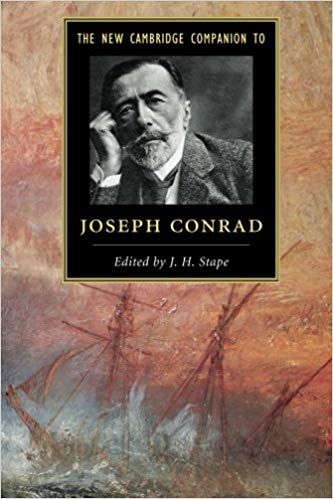tutorial, commentary, study resources, plot, and web links
The Planter of Malata was written in 1914, and first appeared as part of the collection Within the Tides published by J.M. Dent and Sons in 1915. The other stories in the volume were The Partner, The Inn of the Two Witches, and Because of the Dollars.
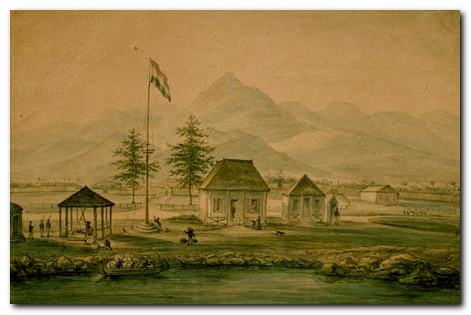
The Planter of Malata – critical commentary
Mystery and suspense
Most first-time readers will have little difficulty working out the mystery of the assistant’s identity. That’s largely because all the communication links between the island, the imperial city, and the correspondent in England are spelled out in a way that draws attention to them. It’s also because the very existence of the assistant acts as a form of what is known as ‘Chekhov’s gun’. This is a dramatic principle established by the Russian dramatist and short story writer that everything in a narrative should be necessary and anything unnecessary should be removed.
If you say in the first chapter that there is a rifle hanging on the wall, in the second or third chapter it absolutely must go off. If it’s not going to be fired, it shouldn’t be hanging there.
After all, Renouard wants to live alone; he does not need an assistant; and he rather uncharacteristically takes him on without knowing anything about him. If the assistant did not have any significance for the narrative, there would be no requirement for his existence in it.
Vigilant readers will suspect this plot development in advance, but Conrad adds a very dramatic twist with the news that the assistant is in fact dead. This is cheating slightly in the compact between author and reader, because we have no way of knowing or even suspecting this in advance. Renouard knows that his assistant is dead, but in the early part of the tale he does not necessarily know that this is the man the Moorsom’s are looking for – because of the confusion in names. They are searching for ‘Arthur’: he only knows that his assistant was called ‘A.Walter’.
Theme
If there is a submerged theme it is that of ‘disappearance’. Renouard wishes to disappear from society in general – which is why he has established himself on the remote island of Malata in the first place. He is drawn back into the gravitational field of society by the powerful sexual attraction he feels for Felicia when he meets her. It might even be argued that this leads to his downfall,
‘Master Arthur’ wishes to disappear because of the financial disgrace in which he has been (falsely) implicated. He escapes to a remote island at the other side of the world and disappears into a life of drugs which leads to his death.
And Renouard too finally disappears. Conrad uses the age-old device of his clothes left on the sea shore. He may have commited a suicide of sorts, or he may have simply removed all traces of his existence and moved on somewhere else. Either way – he has disappeared from the narrative.
The Planter of Malata – study resources
![]() The Planter of Malata – CreateSpace – Amazon UK
The Planter of Malata – CreateSpace – Amazon UK
![]() The Planter of Malata – CreateSpace – Amazon US
The Planter of Malata – CreateSpace – Amazon US
![]() The Planter of Malata – Kindle eBook
The Planter of Malata – Kindle eBook
![]() The Planter of Malata – eBook versions at Project Gutenberg
The Planter of Malata – eBook versions at Project Gutenberg
![]() Joseph Conrad: A Biography – Amazon UK
Joseph Conrad: A Biography – Amazon UK
![]() The Cambridge Companion to Joseph Conrad – Amazon UK
The Cambridge Companion to Joseph Conrad – Amazon UK
![]() Routledge Guide to Joseph Conrad – Amazon UK
Routledge Guide to Joseph Conrad – Amazon UK
![]() Oxford Reader’s Companion to Conrad – Amazon UK
Oxford Reader’s Companion to Conrad – Amazon UK
![]() Notes on Life and Letters – Amazon UK
Notes on Life and Letters – Amazon UK
![]() Joseph Conrad – biographical notes
Joseph Conrad – biographical notes
The Planter of Malata – plot summary
Part I. After five years of exploration and adventure Jeffrey Renouard has settled in seclusion on the island of Malata with an assistant, and has recently been granted the silk farming concession. In conversation with his friend a newspaper editor in the colonial city (Singapore?) Renouard reports having been invited to a dinner party, where he met Felicia Moorsom and was very struck by her attractiveness and her interest in his own background. Renouard lives in isolation and is not used to socialising.
Part II. The editor reveals to Renouard that the Moorsoms are staying in the city incognito. He advises him to let Professor Moorsom into the profitable silk farming business. The Moorsoms have come in search of a man who was engaged to Felicia for a year, but who became involved in a financial scandal and pulled out of the engagement. A subsequent but separate scandal has however revealed his innocence. Felicia wishes to reclaim him, but he cannot be found anywhere. The editor has been asked to join in the search. Renouard goes back to his ship and realises that he has been powerfully affected by the girl.
Part III. Next day the editor reports to Renouard that he has met the Moorsoms at dinner, and that the search for the missing fiancé ‘Master Arthur’ has begun in earnest. That afternoon Renouard visits the Moorsoms and once again is stongly affected by Felicia. He hopes the search for Arthur will last a long time.
Part IV. That night Renouard has a vivid dream of searching in palaces and finding a marble bust which turns out to be Felicia’s head. He then interprets his own dream, after which he becomes a regular visitor to the Moorsoms. He admits to himself that he is desperately in love with a woman who is searching for another man. He has to exercise great self-control to conceal his passionate feelings for her.
Part V. Professor Moorsom reveals to Renouard his strong reservations about Arthur, and his wish to move on to pursue his business engagements. He even doubts his own daughter and her judgements. He asks Renouard to help him by pouring cold water on her plans, and he invites him back to dinner that night.
Part VI. Although he contemplates running away, Renouard attends the dinner. Professor Moorsom again asks him to discourage Felicia in her quest. Renouard makes a very feeble attempt, but she proves immovable in her resolve. She also confirms that no messages have arrived in England from the colonial city.
Part VII. Suddenly the editor arrives with the news that Arthur has been found. A message from England reveals that all correspondence has been with a Mr Walter: he is Renouard’s assistant Walter on the island. Renouard rushes back to his ship and destroys a letter addressed to Mr A Walter he has had in his possession. It is then revealed that the assistant is in fact dead on the island. Renouard knows that the Moorsoms will leave if he tells them, and he feels that he can now somehow replace Arthur.
Part VIII. The whole party sail for Malata, where Renouard stays outside the reef overnight, before embarkation. During the night he swims ashore and instructs his servants to say that Arthur has gone off on a trip round the islands.
Part IX. The party wait for Arthur to return. Renouard is nervous: he discusses ghosts with Professor Moorsom’s elderly siister Emma, and his servant Luiz is asked when Arthur is returning.
Part X. Professor Moorsom hears that some plantation workers have seen ghosts: he wants to investigate the phenomenon further. Renouard goes on a walk onto the headland with Felicia. There she reveals her suspicions and challenges him directly about Arthur. He reveals that Arthur was a drug addict for whom he felt sorry, and who died by falling into a ravine. Felicia claims it was her ambition or her destiny to redeem him. Renouard makes a speech which is part homage, part criticism of her – then makes a feeble lunge at her, before declaring his abject love for her.
Part XI. Renouard realises he has gone as far as possible. The party leave the island next day – the Professor grateful to Renouard, and Felicia critical of him. Renouard threatens to ‘haunt’ her ever afterwards. He then pays off his workers and sends them home.
Part XII. A month later the editor is not satisfied with the explanatory stories that reach his office about Malata, so he takes a ship to visit the island in person. He discovers Renouard’s clothes on a beach, but no body is ever found.
Joseph Conrad – video biography
The Planter of Malata – main characters
| Geoffry Renouard | the reclusive planter of Malata |
| — | his friend, the newspaper editor |
| Professor Moorsom | a physicist and philosopher |
| Felicia Moorsom | his attractive daughter |
| Emma Moorsom | his elderly sister |
| Master Arthur | Felicia’s fiancé |
| Luiz | Renouard’s half-caste manservant |
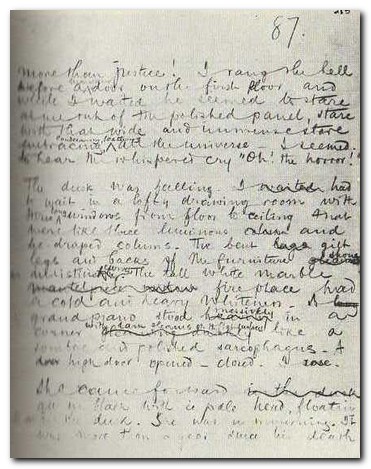
Manuscript page from Heart of Darkness
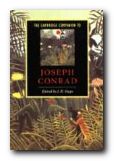 The Cambridge Companion to Joseph Conrad offers a series of essays by leading Conrad scholars aimed at both students and the general reader. There’s a chronology and overview of Conrad’s life, then chapters that explore significant issues in his major writings, and deal in depth with individual works. These are followed by discussions of the special nature of Conrad’s narrative techniques, his complex relationships with late-Victorian imperialism and with literary Modernism, and his influence on other writers and artists. Each essay provides guidance to further reading, and a concluding chapter surveys the body of Conrad criticism.
The Cambridge Companion to Joseph Conrad offers a series of essays by leading Conrad scholars aimed at both students and the general reader. There’s a chronology and overview of Conrad’s life, then chapters that explore significant issues in his major writings, and deal in depth with individual works. These are followed by discussions of the special nature of Conrad’s narrative techniques, his complex relationships with late-Victorian imperialism and with literary Modernism, and his influence on other writers and artists. Each essay provides guidance to further reading, and a concluding chapter surveys the body of Conrad criticism.
![]() Buy the book at Amazon UK
Buy the book at Amazon UK
![]() Buy the book at Amazon US
Buy the book at Amazon US
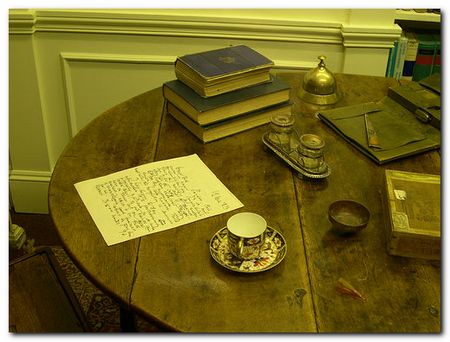
Joseph Conrad’s writing table
Further reading
![]() Amar Acheraiou Joseph Conrad and the Reader, London: Macmillan, 2009.
Amar Acheraiou Joseph Conrad and the Reader, London: Macmillan, 2009.
![]() Jacques Berthoud, Joseph Conrad: The Major Phase, Cambridge: Cambridge University Press, 1978.
Jacques Berthoud, Joseph Conrad: The Major Phase, Cambridge: Cambridge University Press, 1978.
![]() Muriel Bradbrook, Joseph Conrad: Poland’s English Genius, Cambridge: Cambridge University Press, 1941
Muriel Bradbrook, Joseph Conrad: Poland’s English Genius, Cambridge: Cambridge University Press, 1941
![]() Harold Bloom (ed), Joseph Conrad (Bloom’s Modern Critical Views, New York: Chelsea House Publishers, 2010
Harold Bloom (ed), Joseph Conrad (Bloom’s Modern Critical Views, New York: Chelsea House Publishers, 2010
![]() Hillel M. Daleski , Joseph Conrad: The Way of Dispossession, London: Faber, 1977
Hillel M. Daleski , Joseph Conrad: The Way of Dispossession, London: Faber, 1977
![]() Daphna Erdinast-Vulcan, Joseph Conrad and the Modern Temper, Oxford: Oxford University Press, 1991.
Daphna Erdinast-Vulcan, Joseph Conrad and the Modern Temper, Oxford: Oxford University Press, 1991.
![]() Aaron Fogel, Coercion to Speak: Conrad’s Poetics of Dialogue, Cambridge, Mass: Harvard University Press, 1985
Aaron Fogel, Coercion to Speak: Conrad’s Poetics of Dialogue, Cambridge, Mass: Harvard University Press, 1985
![]() John Dozier Gordon, Joseph Conrad: The Making of a Novelist, Cambridge, Mass: Harvard University Press, 1940
John Dozier Gordon, Joseph Conrad: The Making of a Novelist, Cambridge, Mass: Harvard University Press, 1940
![]() Albert J. Guerard, Conrad the Novelist, Cambridge, Mass: Harvard University Press, 1958
Albert J. Guerard, Conrad the Novelist, Cambridge, Mass: Harvard University Press, 1958
![]() Robert Hampson, Joseph Conrad: Betrayal and Identity, Basingstoke: Macmillan, 1992
Robert Hampson, Joseph Conrad: Betrayal and Identity, Basingstoke: Macmillan, 1992
![]() Jeremy Hawthorn, Joseph Conrad: Language and Fictional Self-Consciousness, London: Edward Arnold, 1979
Jeremy Hawthorn, Joseph Conrad: Language and Fictional Self-Consciousness, London: Edward Arnold, 1979
![]() Jeremy Hawthorn, Joseph Conrad: Narrative Technique and Ideological Commitment, London: Edward Arnold, 1990
Jeremy Hawthorn, Joseph Conrad: Narrative Technique and Ideological Commitment, London: Edward Arnold, 1990
![]() Jeremy Hawthorn, Sexuality and the Erotic in the Fiction of Joseph Conrad, London: Continuum, 2007.
Jeremy Hawthorn, Sexuality and the Erotic in the Fiction of Joseph Conrad, London: Continuum, 2007.
![]() Owen Knowles, The Oxford Reader’s Companion to Conrad, Oxford: Oxford University Press, 1990
Owen Knowles, The Oxford Reader’s Companion to Conrad, Oxford: Oxford University Press, 1990
![]() Jakob Lothe, Joseph Conrad: Voice, Sequence, History, Genre, Ohio State University Press, 2008
Jakob Lothe, Joseph Conrad: Voice, Sequence, History, Genre, Ohio State University Press, 2008
![]() Gustav Morf, The Polish Shades and Ghosts of Joseph Conrad, New York: Astra, 1976
Gustav Morf, The Polish Shades and Ghosts of Joseph Conrad, New York: Astra, 1976
![]() Ross Murfin, Conrad Revisited: Essays for the Eighties, Tuscaloosa, Ala: University of Alabama Press, 1985
Ross Murfin, Conrad Revisited: Essays for the Eighties, Tuscaloosa, Ala: University of Alabama Press, 1985
![]() Jeffery Myers, Joseph Conrad: A Biography, Cooper Square Publishers, 2001.
Jeffery Myers, Joseph Conrad: A Biography, Cooper Square Publishers, 2001.
![]() Zdzislaw Najder, Joseph Conrad: A Life, Camden House, 2007.
Zdzislaw Najder, Joseph Conrad: A Life, Camden House, 2007.
![]() George A. Panichas, Joseph Conrad: His Moral Vision, Mercer University Press, 2005.
George A. Panichas, Joseph Conrad: His Moral Vision, Mercer University Press, 2005.
![]() John G. Peters, The Cambridge Introduction to Joseph Conrad, Cambridge: Cambridge University Press, 2006.
John G. Peters, The Cambridge Introduction to Joseph Conrad, Cambridge: Cambridge University Press, 2006.
![]() James Phelan, Joseph Conrad: Voice, Sequence, History, Genre, Ohio State University Press, 2008.
James Phelan, Joseph Conrad: Voice, Sequence, History, Genre, Ohio State University Press, 2008.
![]() Edward Said, Joseph Conrad and the Fiction of Autobiography, Cambridge Mass: Harvard University Press, 1966
Edward Said, Joseph Conrad and the Fiction of Autobiography, Cambridge Mass: Harvard University Press, 1966
![]() Allan H. Simmons, Joseph Conrad: (Critical Issues), London: Macmillan, 2006.
Allan H. Simmons, Joseph Conrad: (Critical Issues), London: Macmillan, 2006.
![]() J.H. Stape, The Cambridge Companion to Joseph Conrad, Cambridge: Cambridge University Press, 1996
J.H. Stape, The Cambridge Companion to Joseph Conrad, Cambridge: Cambridge University Press, 1996
![]() John Stape, The Several Lives of Joseph Conrad, Arrow Books, 2008.
John Stape, The Several Lives of Joseph Conrad, Arrow Books, 2008.
![]() Peter Villiers, Joseph Conrad: Master Mariner, Seafarer Books, 2006.
Peter Villiers, Joseph Conrad: Master Mariner, Seafarer Books, 2006.
![]() Ian Watt, Conrad in the Nineteenth Century, London: Chatto and Windus, 1980
Ian Watt, Conrad in the Nineteenth Century, London: Chatto and Windus, 1980
![]() Cedric Watts, Joseph Conrad: (Writers and their Work), London: Northcote House, 1994.
Cedric Watts, Joseph Conrad: (Writers and their Work), London: Northcote House, 1994.
Other writing by Joseph Conrad
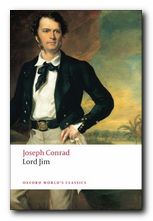 Lord Jim (1900) is the earliest of Conrad’s big and serious novels, and it explores one of his favourite subjects – cowardice and moral redemption. Jim is a ship’s captain who in youthful ignorance commits the worst offence – abandoning his ship. He spends the remainder of his adult life in shameful obscurity in the South Seas, trying to re-build his confidence and his character. What makes the novel fascinating is not only the tragic but redemptive outcome, but the manner in which it is told. The narrator Marlowe recounts the events in a time scheme which shifts between past and present in an amazingly complex manner. This is one of the features which makes Conrad (born in the nineteenth century) considered one of the fathers of twentieth century modernism.
Lord Jim (1900) is the earliest of Conrad’s big and serious novels, and it explores one of his favourite subjects – cowardice and moral redemption. Jim is a ship’s captain who in youthful ignorance commits the worst offence – abandoning his ship. He spends the remainder of his adult life in shameful obscurity in the South Seas, trying to re-build his confidence and his character. What makes the novel fascinating is not only the tragic but redemptive outcome, but the manner in which it is told. The narrator Marlowe recounts the events in a time scheme which shifts between past and present in an amazingly complex manner. This is one of the features which makes Conrad (born in the nineteenth century) considered one of the fathers of twentieth century modernism.
![]() Buy the book from Amazon UK
Buy the book from Amazon UK
![]() Buy the book from Amazon US
Buy the book from Amazon US
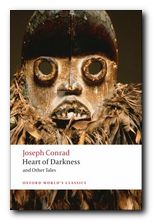 Heart of Darkness (1902) is a tightly controlled novella which has assumed classic status as an account of the process of Imperialism. It documents the search for a mysterious Kurtz, who has ‘gone too far’ in his exploitation of Africans in the ivory trade. The reader is plunged deeper and deeper into the ‘horrors’ of what happened when Europeans invaded the continent. This might well go down in literary history as Conrad’s finest and most insightful achievement, and it is based on his own experiences as a sea captain. This volume also contains ‘An Outpost of Progress’ – the magnificent study in shabby cowardice which prefigures ‘Heart of Darkness’.
Heart of Darkness (1902) is a tightly controlled novella which has assumed classic status as an account of the process of Imperialism. It documents the search for a mysterious Kurtz, who has ‘gone too far’ in his exploitation of Africans in the ivory trade. The reader is plunged deeper and deeper into the ‘horrors’ of what happened when Europeans invaded the continent. This might well go down in literary history as Conrad’s finest and most insightful achievement, and it is based on his own experiences as a sea captain. This volume also contains ‘An Outpost of Progress’ – the magnificent study in shabby cowardice which prefigures ‘Heart of Darkness’.
![]() Buy the book from Amazon UK
Buy the book from Amazon UK
![]() Buy the book from Amazon US
Buy the book from Amazon US
© Roy Johnson 2013
Joseph Conrad web links
Joseph Conrad at Mantex
Biography, tutorials, book reviews, study guides, videos, web links.
Joseph Conrad – his greatest novels and novellas
Brief notes introducing his major works in recommended editions.
Joseph Conrad at Project Gutenberg
A major collection of free eTexts in a variety of formats.
Joseph Conrad at Wikipedia
Biography, major works, literary career, style, politics, and further reading.
Joseph Conrad at the Internet Movie Database
Adaptations for the cinema and television – in various languages. Full details of directors and actors, production notes, box office, trivia, and quizzes.
Works by Joseph Conrad
Large online database of free HTML texts, digital scans, and eText versions of novels, stories, and occasional writings.
The Joseph Conrad Society (UK)
Conradian journal, reviews. and scholarly resources.
The Joseph Conrad Society of America
American-based – recent publications, journal, awards, conferences.
Hyper-Concordance of Conrad’s works
Locate a word or phrase – in the context of the novel or story.
More on Joseph Conrad
Twentieth century literature
Joseph Conrad complete tales
